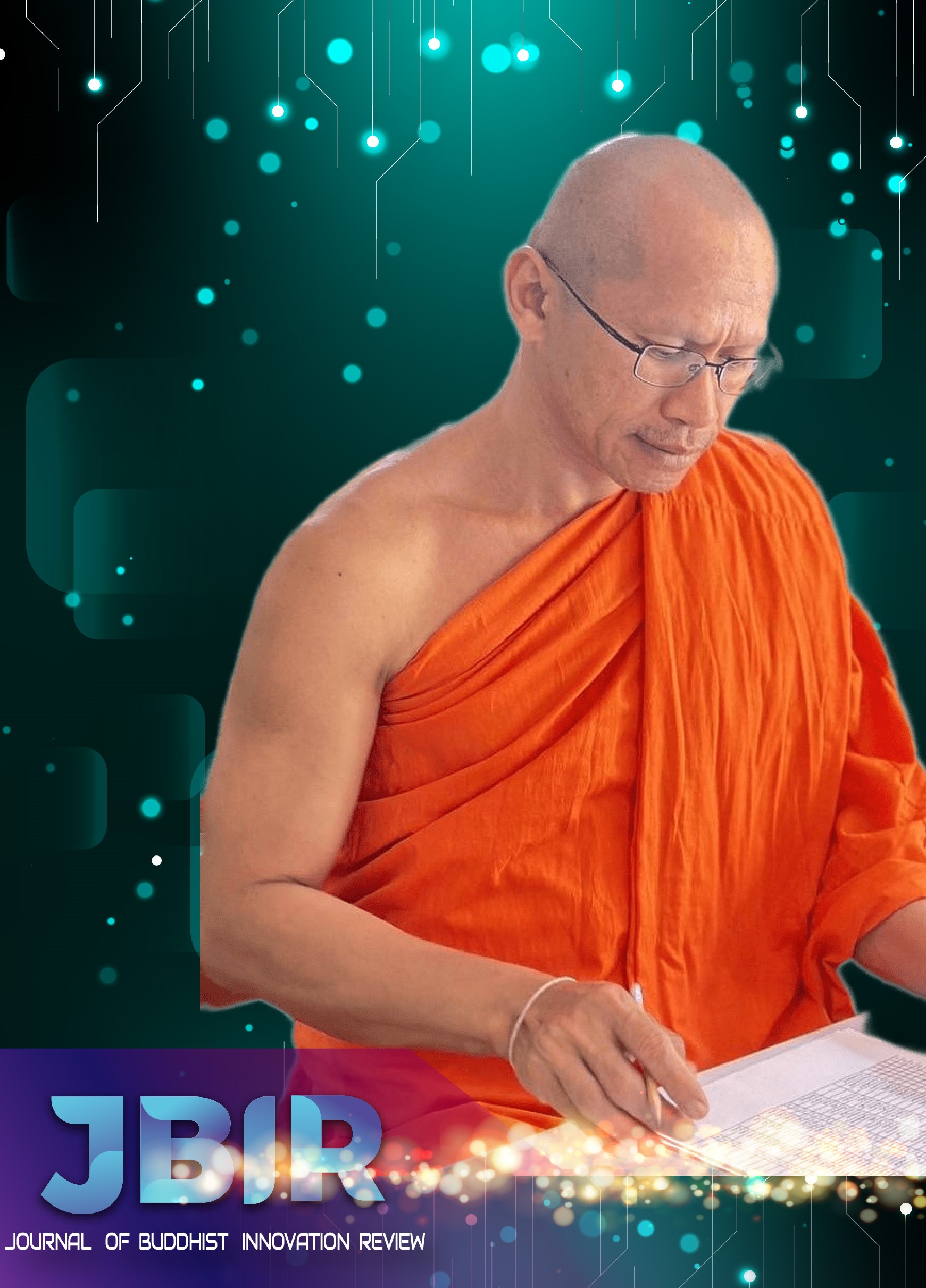Five Precepts: Principles of Conduct for Value of Life in the New Normal Way of Life
Main Article Content
Abstract
Following the principle of five precepts in the different age varies depending upon times, therefore, the social ways in the new normal age need the application of such five precepts to suit one’s ways of life where the precepts involved are properly observed. In following, one’s mind should be trained in accordance with living kindness and compassion where non-harming others, no-desire for others’ property, non-desire for others’ wife, non-lying, and carefulness in living life are strictly observed. Once properly followed, one’s mind would obtain the beauty of life through the thought that loving others is equivalent to loving oneself resulting in creating the principles guaranteeing the safety of life, property, family, society and health, which is accorded with the five precepts. Under these situations, many problems and obstacles would also be solved accordingly giving rise to the happy living together and thereby providing the opportunity to cultivate the perfection of precept encouraging man to avoid bad action leading to the stream of the noble path from the basis to highest level respectively.
Article Details

This work is licensed under a Creative Commons Attribution-NonCommercial-NoDerivatives 4.0 International License.
เรื่องลิขสิทธิ์/เป็นความคิดเห็นของผู้เขียน
References
เอกสารอ้างอิง :
หนังสือ:
คณะสงฆ์ภาค 6. (2560). เบญจศีล-นิจศีลของมนุษย์ทั้งหลาย เก็บเพชรในรอยธรรม 9. กรุงเทพมหานคร: โรงพิมพ์บริษัท ดีไซน์ ดีไลท์ จำกัด.
จำนงค์ อดิวัฒนสิทธิ์. (2547). ศาสนา ชีวิต และสังคม. กรุงเทพมหานคร: สำนักพิมพ์สุขภาพใจ.
ธีรวัส บำเพ็ญบุญบารมี. (2550). หลักฐานเรื่องศีล. นครปฐม: มูลนิธิเบญจนิกาย มหาวิทยาลัยมหามกุฏราชวิทยาลัย.
พระธรรมปิฎก (ประยุทธ์ ปยุตฺโต). (2538). พจนานุกรมพุทธศาสตร์. กรุงเทพมหานคร: โรงพิมพ์มหาจุฬาลงกรณ์ราชวิทยาลัย.
พระพุทธโฆสะเถระ. (2554). วิสุทธิมรรค. สมเด็จพระพุฒาจารย์ (อาจ อาสภมหาเถร) แปลและเรียบเรียง พิมพ์ครั้งที่ 10. กรุงเทพมหานคร: โรงพิมพ์บริษัท ธนาเพรส จำกัด.
พระราชญาณวิสิฐ และคณะ. (2552). คู่มือการศึกษาสัมมาปฏิบัติไตรสิกขา. พิมพ์ครั้งที่ 4. นครปฐม: โรงพิมพ์ บริษัทเพชรเกษม พริ้นติ้ง กรุ๊ป จำกัด.
พระราชวิสุทธิกวี (พิจิตร ฐิตวณฺโณ). (2536). การสั่งสมบุญ ด้วยการรักษาศีล. กรุงเทพมหานคร: ห้างหุ้นส่วนสามัญ สุทธิสารการพิมพ์.
มหาจุฬาลงกรณราชวิทยาลัย.(2539). พระไตรปิฎกภาษาไทย ฉบับมหาจุฬาลงกรณราชวิทยาลัย. กรุงเทพมหานคร: โรงพิมพ์ มหาจุฬาลงกรณราชวิทยาลัย.
สมเด็จพระมหาสมณเจ้า กรมพระยาวชิรญาณวโรรส. (2538). เบญจศีล และเบญจธรรม. กรุงเทพมหานคร: โรงพิมพ์มหามกุฏราชวิทยาลัย.
วารสาร :
สมเด็จพระวันรัต (จุนท์ พฺรหฺมคุตฺโต). (2558) “โลกสงบร่มเย็นได้ด้วยศีล”. พุทธธรรม. วารสารของพุทธ สมาคมแห่งประเทศไทย ในพระบรมราชูปถัมภ์. 63 (354); 3.
สื่ออิเล็กทรอนิกส์ :
โครงการรักษาศีล 5. (2557). [ออนไลน์]. โครงการหมู่บ้านรักษาศีล 5. (สืบค้น 20 ธันวาคม 2566). จาก www.sila5.com/detail.
สำนักงานพระพุทธศาสนาแห่งชาติ. (2557). [ออนไลน์]. คู่มือการดำเนินงานโครงการสร้างความปรองดอง สมานฉันท์โดยใช้หลักธรรมทางพระพุทธศาสนา หมู่บ้านรักษาศีล 5. (สืบค้น 20 ธันวาคม 2566). จาก www.sila5.com.
สำนักกฎหมายและวิชาการศาลยุติธรรม. (2562). [ออนไลน์]. ประมวลกฎหมายอาญา (ฉบับอัพเดทล่าสุด).(สืบค้น 23 มกราคม 2567). เข้าถึงได้จาก www. jla.coj.go.th/th/content/category/detail.
Reference :
Book :
The Sangha of Region 6. (2017). The Five Precepts - The Daily Precepts of All Humans: Gathering Gems in the Path of Dharma 9. Bangkok: Design Delight Printing Company Limited.
Chamnong Adiwattanasit. (2004). Religion, Life, and Society. Bangkok: Suphapjai Publishing House.
Teerawat Bampenbunbaramee. (2007). Evidence Regarding Morality. Nakhon Pathom: Benjanikaya Foundation, Mahamakutrajavidyalaya University.
Phra Dhammapitaka (Prayut Payutto). (1995). Dictionary of Buddhist Studies. Bangkok: Mahachulalongkornrajavidyalaya Printing House.
Buddhaghosa Thera. (2011). Visuddhimagga. Translated and compiled by Somdej Phra Phutthacharn (Ajarn Asabhamaha Thera). 10th edition. Bangkok: Thanapress Co., Ltd.
Phra Ratchayanavisit and (2009). A Guide to Studying the Threefold Training (Samma Patipatti Trisikkha). 4th ed. Nakhon Pathom: Phetkasem Printing Group Co., Ltd.
Phra Ratchawisutthikawi (Phichit Thitawanno). (1993). Accumulating Merit Through Observing the Precepts. Bangkok: Sutthisarn Printing Partnership.
Maha Chulalongkornrajavidyalaya University.(1996). The Thai Tripitaka, Maha Chulalongkornrajavidyalaya University Edition. Bangkok: Maha Chulalongkornrajavidyalaya University Printing House.
His Royal Highness Prince Vajirayanavarorasa (1995). The Five Precepts and the Five Virtues. Bangkok: Mahamakut Buddhist University Printing House.
Journal :
Somdej Phra Wanarat (Chun Phromkhutto). (2015) “The world can be peaceful and serene through morality.” Buddhatham. Journal of the Buddhist Association of Thailand under Royal Patronage. 63 (354); 3.
Electronic media :
The Five Precepts Village Project. (2014). [Online]. The Five Precepts Village Project. (Accessed December 20, 2023). From www.sila5.com/detail.
National Office of Buddhism. (2014). [Online]. Operational Manual for the Reconciliation and Harmony Project Using Buddhist Principles: Villages Upholding the Five Precepts. (Retrieved December 20, 2023) from www.sila5.com.
Office of Legal and Academic Affairs, Court of Justice. (2019). [Online]. Criminal Code (Latest Updated Version). (Accessed January 23, 2024). Available from www.jla.coj.go.th/th/content/category/detail


